|
|

|
|
Author
|
Topic: NASA studies for Earth orbit commercialization
|
Robert Pearlman
Editor Posts: 42988
From: Houston, TX
Registered: Nov 1999
|
 posted 08-08-2018 04:49 PM
posted 08-08-2018 04:49 PM
   
NASA release NASA Invests in Concepts for a Vibrant Future Commercial Space EconomyIn an ongoing effort to foster commercial activity in space, NASA has selected 13 companies to study the future of commercial human spaceflight in low-Earth orbit, including long-range opportunities for the International Space Station. The studies will assess the potential growth of a low-Earth orbit economy and how to best stimulate private demand for commercial human spaceflight. The portfolio of selected studies will include specific industry concepts detailing business plans and viability for habitable platforms, whether using the space station or separate free-flying structures. The studies also will provide NASA with recommendations on the role of government and evolution of the space station in the process of transitioning U.S. human spaceflight activities in low-Earth orbit to non-governmental enterprises. "When the International Space Station was established, we could not have anticipated all of the benefits it would provide," said Sam Scimemi, director of the International Space Station division at NASA Headquarters. "We're excited to receive this input from the commercial market and aerospace experts to help shape a future thriving space economy in which companies contract with each other to conduct research and activities in low-Earth orbit." The selected companies are: - Axiom Space, LLC, of Houston
- Bigelow Aerospace, LLC of Las Vegas
- Blue Origin, LLC, of Kent, Washington
- The Boeing Company of Houston
- Deloitte Consulting of Manhattan Beach, California
- KBRWyle of Houston
- Lockheed Martin Corporation of Littleton, Colorado
- McKinsey & Company, Inc. of Washington, D.C.
- NanoRacks, LLC, of Webster, Texas
- Northrop Grumman of Dulles, Virginia
- Sierra Nevada Company of Louisville, Colorado
- Space Adventures, Inc., of Vienna, Virginia
- Space Systems/Loral, Inc. of Palo Alto, California
The unique concepts and analysis resulting from these studies will help NASA, the administration and Congress develop a strategic approach to expanding opportunities for American industry. NASA's continued investment in a strong and continually growing U.S. space industry in low-Earth orbit will allow the agency to focus on farther horizons as private companies continue successfully providing cargo resupply missions to low-Earth orbit and take advantage of the ability to launch astronauts from American soil. These awards are yet another step in NASA's efforts to foster a broad spectrum of commercial activities in low-Earth orbit where, in the future, NASA will be one of many customers. Application of the concepts and ideas offered through this opportunity will ensure the continuity of human spaceflight and facilitate a vibrant and competitive industrial base for continued U.S. leadership in space. The contracts and amounts are dependent on negotiations with the selectees, but NASA estimates the combined value of all awards will be approximately $11 million, with each contract not to exceed $1 million. The final study reports will be delivered to NASA in December. |
Robert Pearlman
Editor Posts: 42988
From: Houston, TX
Registered: Nov 1999
|
 posted 05-28-2019 11:09 AM
posted 05-28-2019 11:09 AM
   
NASA release Study Input Informs NASA Course for a Vibrant Future Commercial Space EconomyNew insights from companies in the growing space economy are helping NASA chart a course for the future of commercial human spaceflight in low-Earth orbit. Input the companies provided to NASA as part of the studies will inform NASA's future policies to support commercial activities that enable a robust low-Earth orbit economy. NASA selected the following companies to complete studies about the commercialization of low-Earth orbit and the International Space Station, assessing the potential growth of a low-Earth orbit economy and how to best stimulate private demand for commercial human spaceflight: - Axiom Space, LLC, of Houston
- Blue Origin, LLC, of Kent, Washington
- The Boeing Company of Houston
- Deloitte Consulting of Manhattan Beach, California
- KBRWyle of Houston
- Lockheed Martin Corporation of Littleton, Colorado
- McKinsey & Company, Inc. of Washington, D.C.
- NanoRacks, LLC, of Webster, Texas
- Northrop Grumman of Dulles, Virginia
- Sierra Nevada Corporation of Louisville, Colorado
- Space Adventures, Inc., of Vienna, Virginia
- Maxar Technologies, formerly SSL, Inc., of Palo Alto, California
These companies investigated what a commercially viable industry in low-Earth orbit could look like, including: commercialization concepts and technical configurations for habitable platforms in low-Earth orbit, either through the International Space Station or a free-flying platform; business plans that explore the viability of commercial destinations; and the role of government and evolution of the space station in the roadmap to commercialization of low-Earth orbit. Observations from these studies revealed many potential markets that could be part of the future ecosystem in low-Earth orbit.The studies identified that commercial "destinations" could turn a profit from many areas: research and development similar to that seen today on the station as part of the International Space Station U.S. National Laboratory; in-space manufacturing of unique materials or products; video products for entertainment use including films, documentaries and sporting events; sponsorship and marketing; accommodations for space tourism; in-space assembly and servicing of large structures and satellites; and transportation of people and cargo to and from low-Earth orbit. High costs for crew and cargo transportation continue to present a barrier to market entry for both company and consumer. One way to reduce transportation costs could be with economies of scale that could be achieved through a larger market. NASA could play a key role in helping stimulate and facilitate market growth by providing access to the space station to catalyze new markets, aid in technology development, and strengthen the burgeoning industry. Eventually NASA is expected to be a key customer to future commercially operated destinations in low-Earth orbit. NASA will continue to need low-Earth orbit for microgravity research and testing that will enable the success of the agency's plans to go forward to the Moon and Mars, including landing the first woman and next man on the Moon. Providing expanded opportunities for commercial activities at the space station could help catalyze and expand markets, enabling a robust economy in space for many businesses. The agency's ultimate goal in low-Earth orbit is to partner with industry to achieve a robust ecosystem in which NASA is one of many customers purchasing services and capabilities, at a much lower cost than today. The International Space Station is a one-of-a-kind orbiting laboratory. For more than 18 years, humans have lived and worked aboard the complex conducting thousands of experiments in areas such as human research, biology, and physical science, as well as advanced technology development. Many of these experiments, conducted via the ISS National Laboratory, have been research and development with commercial objectives. New opportunities are needed to move beyond research and development, and the station will play an essential role in enabling those opportunities for new commercial markets needed to build a sustainable ecosystem in low-Earth orbit. 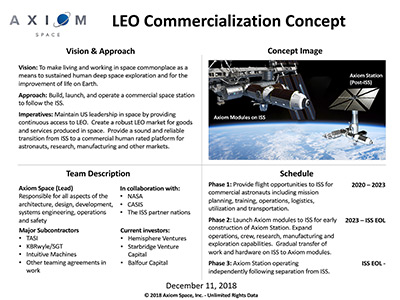 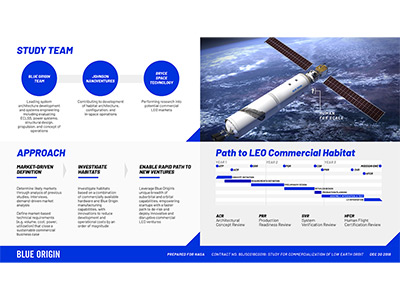
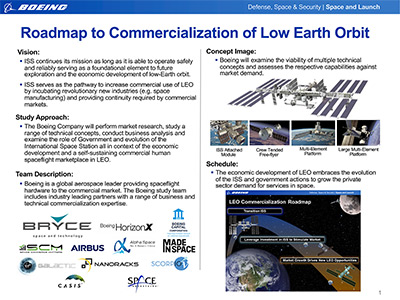
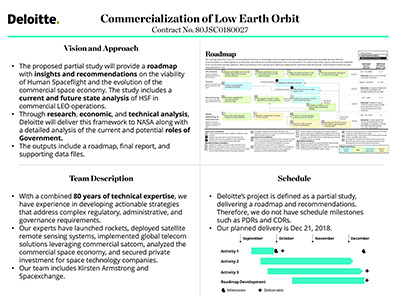
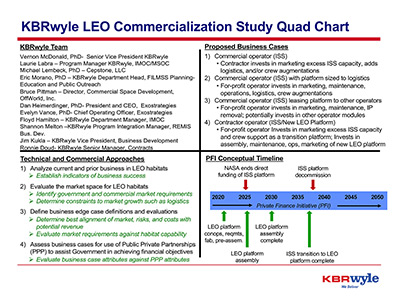
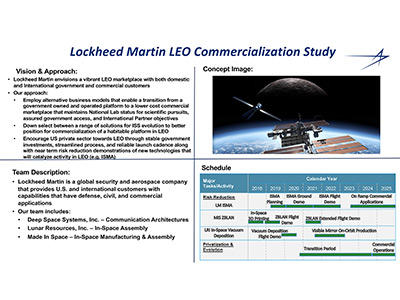
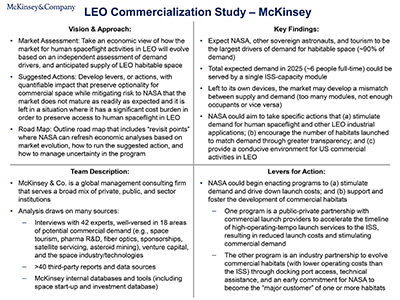
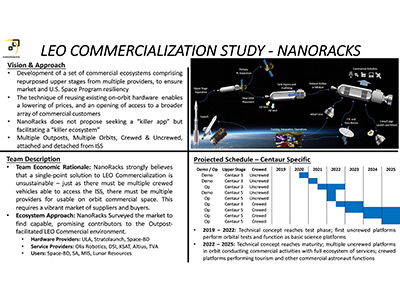
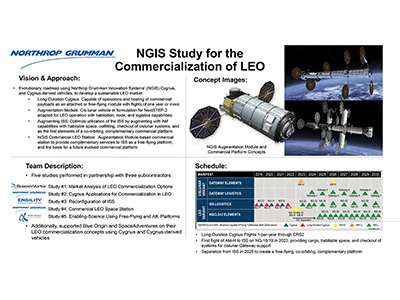
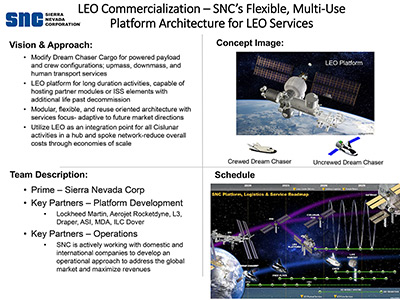
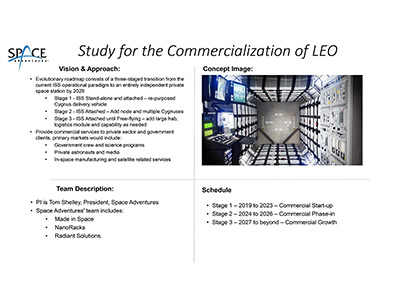
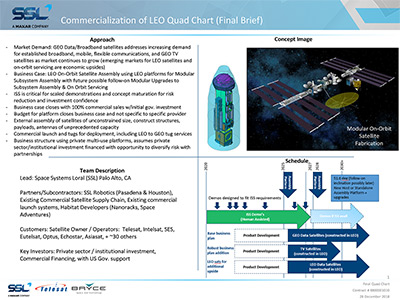
| |
Contact Us | The Source for Space History & Artifacts
Copyright 2020 collectSPACE.com All rights reserved.

Ultimate Bulletin Board 5.47a
|
|

|
 advertisement advertisement

|























